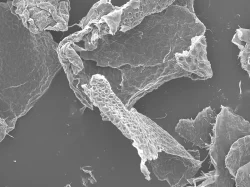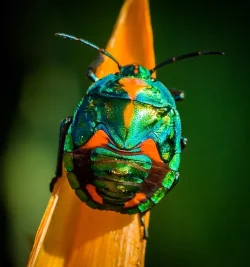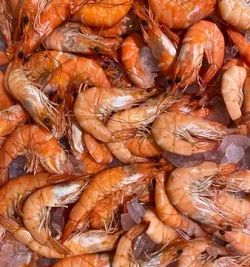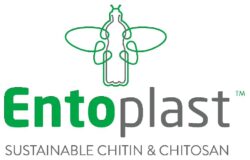
CHITIN
A Natural Biopolymer
High purity Chitin and Chitosan from Insects
Our product delivers improved strength, flexibility, and reliability over traditional chitin and chitosan, and with a green twist. We promise quality without compromise, holding ourselves to the highest environmental standards to create a product that’s kind to both our customers and our planet.
Pioneering the Supply of Chitin and Chitosan from Insects
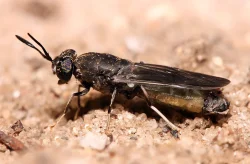

OUR STORY
Born from a need for greener alternatives in the market, our high-quality insect biomaterials were created by Entoplast. We saw the potential in insects as a renewable resource and developed a ground-breaking extraction process that not only significantly reduces environmental harm but also delivers a superior product. We’re not just making a difference—we’re redefining what it means to be a responsible brand in the 21st century.
Our meticulous extraction and refinement uphold the highest standards, offering eco-friendly solutions that amplify your products and initiatives, all while nurturing a greener, more sustainable tomorrow.

Tiny Organisms, Profound Impact: The Power of Insects
At Entoplast we extract high value biomaterials from insects for use in multiple industries. We supply sustainable, high quality biomaterials that power our circular economy.
These biomaterials hold the promise of sustainable innovation across industries, addressing environmental concerns while offering functional, adaptable, and forward-thinking solutions.
What is Chitin?
Chitin is the second most abundant natural biopolymer derived from exoskeletons of crustaceans and also from cell walls of fungi and insects.
Chitin is chemically similar to cellulose, which is another polysaccharide found in plant cell walls. It provides rigidity and strength to the structures it composes, such as the protective shells of insects and crustaceans. In addition to its structural role, chitin also serves as a defence mechanism against pathogens and predators.
Why Buy Our Chitin?
Conventional chitin is derived from crustaceans, a source that contributes to pollution, lacks traceability, and exhibits variation in quality.
Our chitin is meticulously extracted from insects we breed ourselves, ensuring uncompromised quality and a truly sustainable source.
Honeycomb Structure
Our chitin is created using a revolutionising technique to extract the purest and highest quality of chitin. The chitin obtained has a unique honeycomb structure making it stronger than the chitin derived from shellfish.
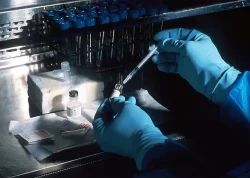
Consistent Quality
Our chitin derived from insects have consistent and high-quality properties due to the controlled farming conditions. Crustacean-derived chitin vary in quality based on factors like species, habitat, and extraction methods.
Green Extraction
Our chitin uses an innovative green approach to extract chitin from insects which utilises recyclable natural fluids unlike the traditional method which relies on strong acids to breakdown the minerals on the crustaceans.
Sustainable and Circular Economy
At Entoplast we use organic waste to feed our insects which convert it into valuable biomass. This creates a closed-loop system where waste is repurposed into valuable chitin resources, diverting organic waste from landfills which cuts green house gases emissions by up to 40%.
Reduced Impact on Ecosystems
Harvesting chitin from crustaceans contributes to overfishing and disrupt marine ecosystems. Insect farming has a smaller ecological footprint and does not contribute to the depletion of natural crustacean populations.
Lower CO2 Emissions
The farming of insects produces fewer greenhouse gas emissions compared to crustacean farming, which often involves energy-intensive processes such as water pumping, aeration, and transportation. The in house production of the insects and shorter supply chain substantially reduces the carbon footprint.
Applications of Chitin
Wound Dressings – Chitin is a natural polymer that possesses excellent properties that are advantageous for wound dressing namely biocompatibility, biodegradability, haemostatic activity and anti‐infection properties
Supplements – Chitin supplementation is often used to manage healthy cholesterol levels and body weight. Additional uses of chitin include the support of kidney function.
Cosmetics – Chitosan is commonly used in cosmetic and skin care applications as it helps to maintain skin moisture, tone skin, treat acne, provide extracellular matrix support, and promote the skin’s natural barrier function.
Water Purification – Chitosan has many attractive properties such as hydrophobicity, biocompatibility, biodegradability, non-toxicity and the presence of very reactive amino (–NH2) and hydroxyl (–OH) groups in its backbone, which makes chitosan to be used as an effective adsorbent material for the removal of wastewater pollutants
Food Packaging – Chitosan due to its antimicrobial, biodegradable, non toxic and anti fungal properties is considered a great natural alternate to the petroleum based plastics that are currently being used for food packaging.
3D Printing – Chitin and Chitosan are being used as bio based materials to create biodegradable filaments for 3D printing. Applications include medical implants such as scaffolds for tissue engineering, drug delivery systems and bio inks for bioprinting tissue like structures.
Pharmaceutical – Chitosan coated tablets improve drug stability and control release ratesChitosan nanoparticles protect insulin in the digestive system for oral delivery
Agriculture – Chitin and chitosan in agriculture act as natural pesticides, soil enhancers, and disease-resistant agents. They extend produce shelf life, improve aquaculture, and reduce chemical pesticides. These materials support eco-friendly farming and erosion control.
Textiles – Chitin and chitosan enhance textiles through antimicrobial, eco-friendly, and functional properties. They offer biodegradability, fire resistance, UV protection, and dyeing capabilities. These versatile materials boost fabric durability and sustainability.
Food & Beverage – Chitosan is used as a fining agent in wine and beer production to remove suspended particles, proteins, and unwanted compounds, resulting in clearer and more stable beverages
Health Benefits
Shellfish allergy is one of the most common food allergies. Chitin, derived from shellfish, can trigger allergic reactions in sensitive individuals. Our chitin eliminates the allergic risks associated with shellfish sourced chitin.
Your exclusive source for insect-derived chitin and chitosan in the UK. Elevate your products with sustainable biomaterials, setting new standards for quality and eco-conscious innovation.











